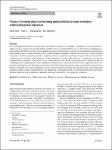Item Infomation
Full metadata record
| DC Field | Value | Language |
|---|---|---|
| dc.contributor.author | Ethan, King | - |
| dc.contributor.author | Yulan, Li | - |
| dc.contributor.author | Shenyang, Hu | - |
| dc.date.accessioned | 2023-04-18T02:32:32Z | - |
| dc.date.available | 2023-04-18T02:32:32Z | - |
| dc.date.issued | 2023 | - |
| dc.identifier.uri | https://link.springer.com/article/10.1007/s00466-023-02289-9 | - |
| dc.identifier.uri | https://dlib.phenikaa-uni.edu.vn/handle/PNK/8023 | - |
| dc.description | CC BY | vi |
| dc.description.abstract | We model temperature dynamics during Shear Assisted Proccess Extrusion (ShAPE), a solid phase process that plasticizes feedstock with a rotating tool and subsequently extrudes it into a consolidated tube, rod, or wire. Control of temperature is critical during ShAPE processing to avoid liquefaction, ensure smooth extrusion, and develop desired material properties in the extruded products. Accurate modeling of the complicated thermo-mechanical feedbacks between process inputs, material temperature, and heat generation presents a significant barrier to predictive modeling and process design. In particular, connecting micro-structural scale mechanisms of heat generation to macro-scale predictions of temperature can become computationally intractable. | vi |
| dc.language.iso | en | vi |
| dc.publisher | Springer | vi |
| dc.subject | ShAPE | vi |
| dc.title | Physics-informed machine-learning model of temperature evolution under solid phase processes | vi |
| dc.type | Book | vi |
| Appears in Collections | ||
| OER - Kỹ thuật điện; Điện tử - Viễn thông | ||
Files in This Item:

